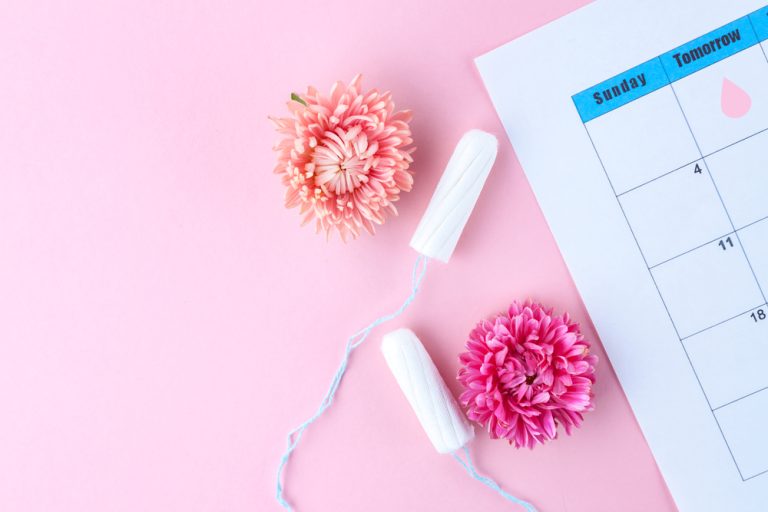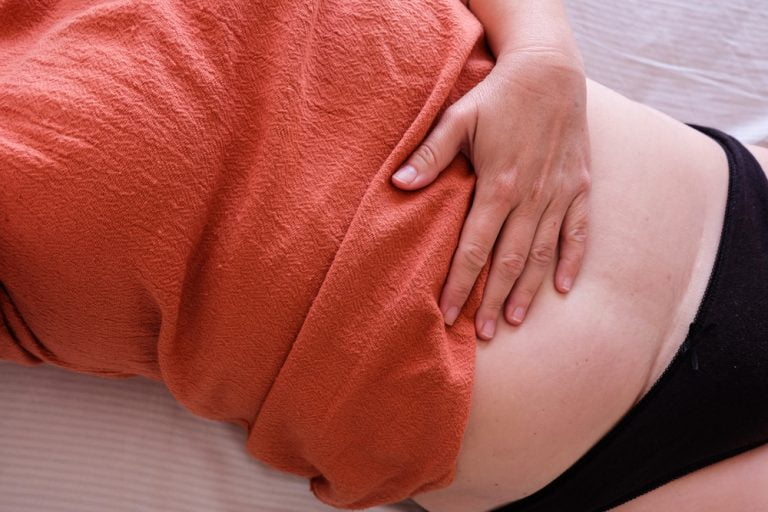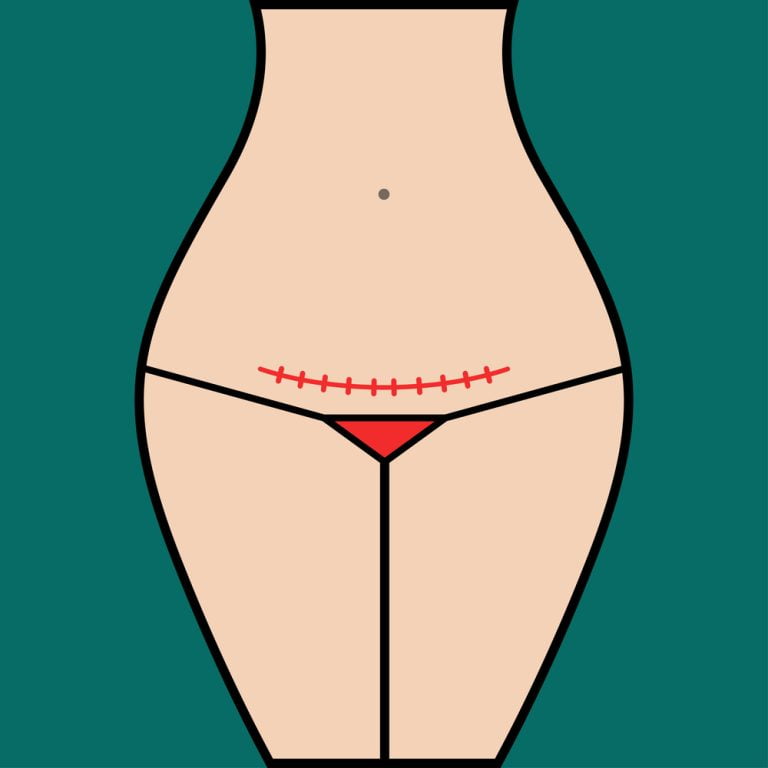Your internal stitches will start dissolving a few days after your c-section. But your incision will be very fragile for 6 weeks and may not fully heal for 3 months.
It can be unnerving to have a wound you can’t see. So, you’re probably wondering, “How do I know if my c-section has opened inside?”
The good news is that it’s incredibly rare and difficult to open your internal incision. But it is possible, so here’s the golden rule:
You should feel slightly better and bleed a little less every day post-c-section. If you start to feel worse, see your doctor right away.
How Can I Tell if My C-Section Has Opened Inside?
Monitoring your internal stitches can be scary because you can’t see what’s happening. But don’t overthink it. Your body has many ways to let you know if something’s wrong. Here’s what to look out for:
Heavy Vaginal Bleeding, After the First 24 Hours.
Bleeding is normal for the first 4 to 6 weeks. But, if you’re soaking through a pad in an hour for more than 2 hours or your bleeding is increasing rather than decreasing, call your doctor.
Fresh Blood
If your postpartum blood loss (lochia) turned brown but is suddenly red again, this can indicate fresh bleeding.
Offensive Smelling Lochia
Normal lochia has a slightly metallic, but not offensive, smell. If the odor changes and becomes foul, it could be a sign of infection, a common side effect of an open incision.
Passing Large Blood Clots
It’s normal to pass some blood clots for 1 to 3 days postpartum. But, you should report any clots larger than a plum or arriving more than 3 days after delivery.
Severe Abdominal Pain
Your pain should decrease each day after your c-section. Call your doctor if it suddenly increases or becomes unmanageable.
Fever
A fever of over 100.4 °F is a sign of infection and a medical emergency.
Dizziness or Feeling Faint
Internal bleeding can cause low blood pressure and dizziness.
Shortness of Breath
If you’re gasping or struggling to catch your breath, call a doctor immediately. It’s another symptom of internal bleeding.
Bruising on Your Stomach, Apart From That Around Your Incision
Bruising on your stomach, away from your incision, might mean your incision has opened and you’re bleeding internally.
Painful Urination
Pain when using the bathroom could be a sign of ripped stitches and infection.
Severe Constipation or Painful Bowel Movements
You may find bowel movements uncomfortable for a week post-section. But, if they become more painful or the discomfort lasts longer than a week, call your doctor.
What Can Cause A C-Section To Open Inside?
The internal opening of your c-section wound is known as postpartum uterine wound dehiscence. Fortunately, it’s rare and only occurs in 0.6% of cases.
It can be caused by:
- Exercising too soon post delivery.
- Heavy lifting.
- Sex before 4 weeks postpartum.
- Infection.
- Poor suturing.
What Happens if My C-Section Opens Inside?
If you suspect your internal incision has opened, call your doctor. It’s a potentially life-threatening complication.
Then, your doctor will assess how much your wound has opened, and you’ll be treated in one of the following ways:
- A small opening can be treated with antibiotics to prevent infection while your body heals. Your doctor may also fit a drain to help excess fluid escape and prescribe extra pain medication.
- A mid-sized wound will need surgery. Your surgeon will access your incision, remove dead tissue, and resuture.
- A complete uterine rupture may require a hysterectomy. This is incredibly rare.
How to Avoid Rupturing Your Internal Stitches After a C-Section
To avoid ripping your internal stitches, you should:
- Get plenty of rest.
- Don’t lift or push anything heavier than your baby for 6 weeks.
- Eat well. Your diet should include lots of fruits, vegetables, and lean protein.
- Avoid strenuous exercise until your doctor signs you off.
- Delay sex after a c-section until 4 to 6 weeks postpartum.
- Take a laxative if you’re experiencing constipation.
- Drink plenty of water.
- Avoid bending.
Final Thoughts
Remember that tearing your internal stitches is rare. So don’t panic if you’ve accidentally overdone it. But do keep an eye on your temperature, bleeding, and pain levels. And, if you’re in doubt, see your doctor immediately.





I had my internal stitches pop right after surgery. My story is extreme bc I was left permanently disabled. The obgyn said the hospital mandated cheaper sutures. I have heard of a couple other pts with internal stiches popping. Do u know if this is happening more often over the last 10 years?
Hello Zara, that happens to me 6 months ago, I never hear anybody with the same situation
I been frustrated, I was pretty healthy and for me there was no way that one of my points blowed out how the doctor said, I had c section on the 07th and hernia surgery 3 days after. The worst pain I ever had
What happens if I don’t report to my doctor that I might have ruptured my internal incision
Happened to me- 5 days post c section. I have to go to the OB every day to get my incision wet packed